
E&G Quaternary Science Journal
metrics 2024
Unlocking the Secrets of Earth’s Past
Introduction
E&G Quaternary Science Journal, published by COPERNICUS GESELLSCHAFT MBH in Germany, stands as a prominent open-access platform dedicated to disseminating high-quality research in the fields of archaeology, geology, paleontology, and stratigraphy since its inception in 1979. With its ISSN 0424-7116 and E-ISSN 2199-9090, the journal has achieved remarkable recognition, indicated by its Q1 quartile ranking in archaeology across both arts and humanities sections, and its strong placements within the social sciences and Earth sciences categories. The journal provides crucial insights into the Quaternary period, contributing to our understanding of climate change, human evolution, and geological processes, making it invaluable for researchers, professionals, and students engaged in these collaborating disciplines. As an open-access journal since 2008, it ensures that cutting-edge research is readily available to a global audience, promoting knowledge exchange and facilitating advancements within the scientific community. The continuous commitment to excellence and its strategic focus on high-impact research positions E&G Quaternary Science Journal as a cornerstone publication in quaternary science.
Metrics 2024
 0.41
0.41 1.30
1.30 1.50
1.50 30
30Metrics History
Rank 2024
Scopus
IF (Web Of Science)
JCI (Web Of Science)
Quartile History
Similar Journals
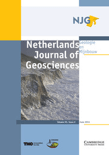
NETHERLANDS JOURNAL OF GEOSCIENCES-GEOLOGIE EN MIJNBOUW
Connecting Researchers, Inspiring DiscoveriesNETHERLANDS JOURNAL OF GEOSCIENCES-GEOLOGIE EN MIJNBOUW is a prestigious, open-access journal published by Cambridge University Press that has been a significant contributor to the field of geology since its inception in 1970. With an impressive impact factor reflected in its Q2 ranking in Geology and a commendable Scopus rank of #84 out of 321 in Earth and Planetary Sciences, this journal serves as a vital platform for disseminating high-quality research and advancements in geosciences. Researchers, professionals, and students alike benefit from accessible and rigorous articles that address current challenges and innovations in geology. The journal has embraced an open-access model since 2019, further enhancing its reach and ensuring that critical knowledge is available to a global audience. Set in the picturesque Netherlands, the journal aims to foster collaboration and dialogue within the scientific community and to inspire future generations of geoscientists.
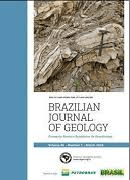
Brazilian Journal of Geology
Illuminating the Earth's Mysteries Through ResearchBrazilian Journal of Geology, the flagship publication of the SOC BRASILEIRA GEOLOGIA, has been a beacon of geoscientific research since its inception in 2013. With an ISSN of 2317-4889 and an E-ISSN of 2317-4692, this open-access journal has facilitated the dissemination of high-quality research across various branches of geosciences, making it freely accessible to a global audience since 2014. Hailing from Brazil, the journal proudly holds a Q2 ranking in Earth and Planetary Sciences as of 2023, and ranks #73 out of 195 in Scopus, indicating its growing impact and relevance in the field. The Brazilian Journal of Geology aims to bridge diverse geological studies with interdisciplinary approaches, promoting the understanding and application of geology in addressing contemporary scientific challenges. As it converges research from 2013 to 2024, the journal not only enriches the academic landscape but also serves as a vital resource for researchers, professionals, and students eager to explore the complexities of the Earth and its processes.

Geografia Fisica e Dinamica Quaternaria
Bridging Theory and Practice in Quaternary GeologyGeografia Fisica e Dinamica Quaternaria is a leading Italian journal dedicated to the exploration and understanding of Earth-surface processes through the lens of Quaternary geology. Published by the COMITATO GLACIOLOGICO ITALIANO, this journal has been a key player in the dissemination of pivotal research since 1978, significantly contributing to the field of Earth and Planetary Sciences. With an ISSN of 0391-9838 and E-ISSN 1724-4781, it serves as an essential platform for scholars and practitioners, offering insights into the dynamics of climate change, glacial processes, and landscape evolution. Although categorized in the Q3 quartile for Earth-surface processes in 2023, the journal continues to foster a robust academic community, emphasizing the significance of interdisciplinary approaches in understanding our planet's past and present. Access options may vary, presenting potential considerations for readers. By bridging theoretical research with practical implications, Geografia Fisica e Dinamica Quaternaria remains an indispensable resource for advancing knowledge and promoting dialogue within the scientific community.
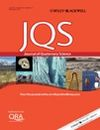
JOURNAL OF QUATERNARY SCIENCE
Advancing Understanding of Earth's Dynamic HistoryThe JOURNAL OF QUATERNARY SCIENCE, published by Wiley, stands as a premier platform for the dissemination of pivotal research in the fields of Arts and Humanities, Earth and Planetary Sciences, and Paleontology. With its ISSN 0267-8179 and E-ISSN 1099-1417, this esteemed journal has achieved an impressive Q1 ranking across multiple categories in 2023, highlighting its significant impact and relevance within the academic community. With a history extending from 1986 to 2024, it offers a treasure trove of knowledge, presenting cutting-edge studies that advance our understanding of Quaternary science. Although the journal does not operate under an Open Access model, it remains highly regarded, as evidenced by its Scopus rankings positioning it in the top percentiles within its categories. Researchers, professionals, and students alike will benefit from the robust insights and innovative research published in this journal, making it an essential resource for anyone engaged in the study of Quaternary environments and their implications on our planet’s history.

BULLETIN OF THE GEOLOGICAL SOCIETY OF DENMARK
Innovative Insights into Denmark's Geological WondersBULLETIN OF THE GEOLOGICAL SOCIETY OF DENMARK, published by the Geological Society of Denmark, serves as a key platform for the dissemination of original research and comprehensive reviews related to geological studies in Denmark and beyond. With an ISSN of 2245-7070, this journal provides a significant avenue for sharing findings that contribute to our understanding of geological processes, resources, and the history of the Earth. Although it operates under traditional access options, the journal encourages a rich scholarly dialogue among researchers, professionals, and students alike. Its impact is evident in the broad scope it covers, catering to diverse areas of geology, including but not limited to sedimentology, paleontology, and environmental geology. By fostering an environment of knowledge sharing, the BULLETIN OF THE GEOLOGICAL SOCIETY OF DENMARK is not just a journal; it is a vital resource for anyone invested in advancing geological science.

Swiss Journal of Geosciences
Unlocking the Secrets of Our Planet, One Article at a TimeSwiss Journal of Geosciences is a prestigious academic journal dedicated to advancing the field of geosciences, published by SPRINGER INTERNATIONAL PUBLISHING AG. Since its inception in 2007, the journal has established itself as a leading platform for disseminating high-quality research findings in various domains related to Earth and planetary sciences, achieving a notable Q1 ranking in Geology as of 2023. With a solid reputation reflected in its Scopus ranking of Rank #72/321, the journal stands in the 77th percentile within its category. Based in Switzerland, the Swiss Journal of Geosciences embraces an open access model, making it easier for researchers, professionals, and students worldwide to access vital geological research without barriers. The journal’s objectives include promoting interdisciplinary research and fostering insights that address both fundamental and applied geoscientific problems, ensuring it remains a crucial resource for those seeking to understand our planet’s dynamics. Engage with pioneering research and contribute to the vibrant community of geoscientists by exploring the impactful articles published within its pages.
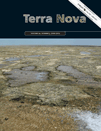
TERRA NOVA
Shaping the Future of Geological ResearchTERRA NOVA, published by WILEY, is a leading journal in the field of Geology, with a remarkable impact within the academic community. With the ISSN 0954-4879 and E-ISSN 1365-3121, the journal has been a pivotal platform for innovative research since its inception in 1989 and will continue its influence through to 2024. Ranked in the top tier (Q1) of its category for 2023, TERRA NOVA holds an esteemed position with a Scopus ranking of 67 out of 321 in Earth and Planetary Sciences, showcasing its dedication to high-quality, impactful scientific discourse. The journal covers a diverse range of topics within geology, providing valuable insights for environmental scientists, geologists, and industry professionals. By fostering an interdisciplinary approach, TERRA NOVA remains committed to advancing the understanding of geological processes and their implications for society. With a dedicated readership of researchers, professionals, and students, this journal is essential for those looking to stay abreast of the latest developments and trends in the field.
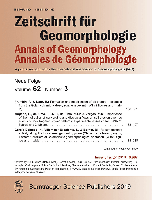
ZEITSCHRIFT FUR GEOMORPHOLOGIE
Advancing Knowledge in Geomorphological Processes.ZEITSCHRIFT FUR GEOMORPHOLOGIE is a prestigious journal dedicated to the field of geomorphology, published by GEBRUDER BORNTRAEGER from Germany. With the ISSN 0372-8854 and E-ISSN 1864-1687, this journal serves as a vital platform for researchers, professionals, and students interested in understanding the dynamic processes that shape our Earth’s surface. The journal has consistently maintained a solid academic reputation, achieving a Q3 ranking in key categories including Earth and Planetary Sciences (miscellaneous), Earth-Surface Processes, and Geography, Planning and Development as of 2023. This reflects its position within the global scientific community; ranked at #93 out of 179 in Earth-Surface Processes, contributing to crucial discussions surrounding environmental changes and landform evolution. Although ZEITSCHRIFT FUR GEOMORPHOLOGIE is not an Open Access publication, it offers extensive insights and findings from converged years spanning from 1979 to 2019 and again from 2021 to 2022. The journal is located at Johannesstr 3A, D-70176 Stuttgart, Germany, and plays a pivotal role in advancing geomorphological research that impacts natural sciences, ecology, and planning strategies worldwide.
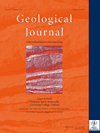
GEOLOGICAL JOURNAL
Connecting disciplines to deepen our geological understanding.GEOLOGICAL JOURNAL, an esteemed publication by WILEY, has been at the forefront of geological research since its inception in 1951. With an ISSN of 0072-1050 and E-ISSN of 1099-1034, this journal serves as a vital platform for disseminating high-quality, peer-reviewed research in the field of geology. Operating out of the United Kingdom, the journal proudly features a Scopus rank of 80 out of 321 in the Earth and Planetary Sciences category, reflecting its commitment to scholarly excellence, with a 2023 category quartile ranking of Q2. As part of its innovative approach, GEOLOGICAL JOURNAL seeks to foster interdisciplinary collaborations, advancing our understanding of earth processes, materials, and history. Although it does not offer open access options, its robust subscription model ensures that both professionals and students have access to groundbreaking insights. With a publication history that spans over seven decades, the GEOLOGICAL JOURNAL continues to be an indispensable resource for the global geological community, encouraging discoveries that shape our comprehension of the planet.
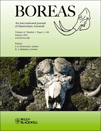
BOREAS
Pioneering Research in Archaeology and EcologyBOREAS is a prestigious academic journal published by WILEY, dedicated to advancing knowledge across the fields of Archaeology, Ecology, Evolution, Behavior, Systematics, and Geology. With a commendable track record since its inception in 1972, BOREAS has consistently contributed to the scholarly landscape, currently holding a distinguished position in Q1 across multiple categories, including a ranking of #8 in Archaeology and a solid percentile rank in Ecology and Geology. This high-impact journal fosters the dissemination of groundbreaking research, further establishing itself as a vital resource for researchers, professionals, and students alike. While access options are limited to subscription-based, the quality and significance of research published in BOREAS make it an essential addition to any academic library, ensuring that studies conducted in these pivotal fields reach a global audience. With a commitment to excellence and innovation, BOREAS continues to drive forward the frontiers of knowledge and understanding in Earth and planetary sciences.